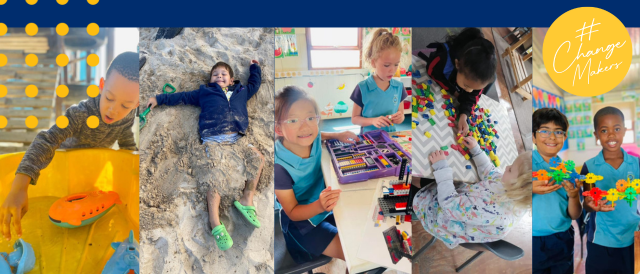At Melkbosstrand Private School we say “Let Them Play!” Why? …because at MPS we understand the impact and power of play-based learning in today’s world of education. In this article we take a look at the innovative concept of play-based learning and the role it plays in shaping our young learners as they embark on their educational journey at MPS.
Often structured lessons and formal assessments take centre stage in education and it’s easy to overlook the incredible impact that play can have on a child’s development. Play is not just a pastime; it is a fundamental tool that fosters creativity, problem-solving, and social skills. Through incorporating learning through play into the Early Childhood Development (ECD) curriculum at MPS’ Noah’s Ark and even in the foundation phases we pave the way for holistic growth and lifelong learning.
The Nature of Play-Based Learning
Play-based learning is exactly what it sounds like: learning through play. It emphasises hands-on experiences, imagination, and exploration as vehicles for knowledge acquisition. This approach acknowledges that children are naturally curious and have an innate desire to explore their environment. By harnessing this curiosity and allowing them to learn through interactive play, educators can create a strong foundation for future academic and personal success.
Fostering Creativity and Imagination
When children engage in play, they’re not bound by rules or predetermined outcomes. This freedom allows them to exercise their creativity and imagination without fear of failure. Whether it’s building elaborate structures with blocks, creating stories with dolls and action figures, or designing imaginative art projects, this type of learning encourages the development of creative thinking skills that are essential in problem-solving and innovation.
Developing Social and Emotional Skills
Play-based learning is inherently social. When children engage in collaborative play, they learn how to negotiate, communicate, share, and empathise with others. These interactions are the building blocks of essential social and emotional skills. Through group activities and role-playing, children discover how to work together, resolve conflicts, and understand different perspectives – all of which contribute to healthy interpersonal relationships.
Nurturing Cognitive Growth
Learning through play isn’t just about fun; it also contributes to cognitive development. Whether it’s sorting shapes, counting blocks, or experimenting with cause and effect, play-based activities stimulate critical thinking and problem-solving skills. Hands-on experiences allow children to make connections between abstract concepts and real-world situations, leading to a deeper understanding of various subjects.
Tailoring Learning to Individual Needs
One of the remarkable features of play-based learning is its adaptability. Each child learns at their own pace and in their own style. Activities can be customised to suit different learning preferences, making education more inclusive and effective. Whether a child is a visual, auditory, or kinesthetic learner, this type of learning offers multiple entry points for understanding and engagement.
Encouraging Lifelong Learning
Perhaps one of the most significant advantages of play-based learning is its potential to instil a love of learning from a young age. When learning is associated with joy, curiosity, and exploration, children are more likely to develop a positive attitude toward education. This enthusiasm for learning can set the stage for a lifelong pursuit of knowledge and personal growth.
Integrating Play-Based Learning in the Curriculum
Incorporating learning through play into the ECD and foundation phase curriculum requires a deliberate and thoughtful approach. Educators design activities that align with learning objectives while encouraging creativity and exploration.
Here are some practical ways we integrate play-based learning:
Learning Stations – we set up different play-based learning stations that focus on various skills, such as a science exploration station, an art station, a building area, and a dramatic play zone.
Open-Ended Materials – Providing materials that have multiple uses, allowing children to experiment and create in diverse ways. Items like building blocks, clay, and art supplies can inspire endless possibilities.
Guided Play – All play is guided, not directed. This is also referred to as ‘scaffolding’ which sees the teacher play alongside the children with a specific learning goal in mind – for example, a guided scavenger hunt can teach children about shapes, colours, and patterns.
Outdoor Exploration – Nature itself is a playground of learning opportunities. Outdoor activities like nature-focused exploration, gardening, and outdoor games stimulate both physical and cognitive growth.
Storytelling and Role-Playing – Encouraging children to create their own stories and engage in role-playing enhances language skills, creativity, and social interaction.
In the quest to provide young learners with a strong foundation for their educational journey, learning through play stands as a powerful ally. Its ability to foster creativity, nurture social skills, stimulate cognitive growth, and ignite a passion for learning is unparalleled. By recognizing the importance of play in education and incorporating it thoughtfully into the curriculum, MPS educators ensure that children not only have the opportunity to excel academically but also develop into well-rounded individuals or MPS #Changemakers who are prepared for the challenges of the future. So, as we say “let them play” – for in play, the seeds of lifelong learning are sown.
Joining the ranks of MPS #Changemakers is as easy as a ‘hop, skip and a jump’!
Contact MPS today and get ready to reap the benefits of learning through play in our unique environment – we have space available!


Recent Comments